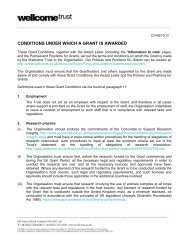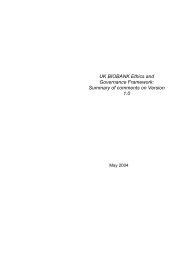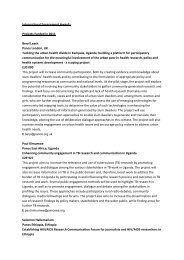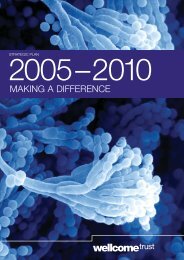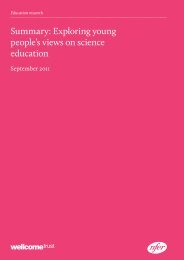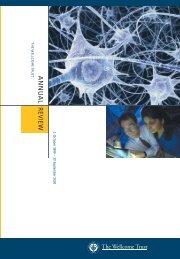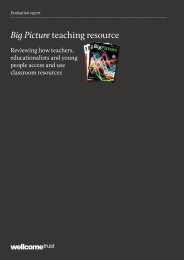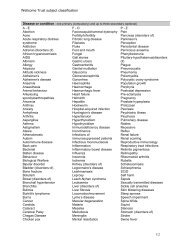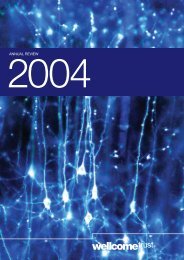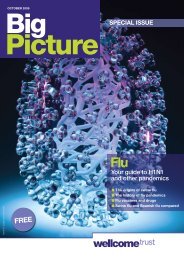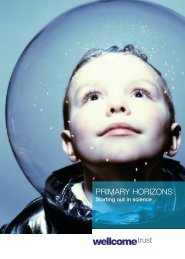Create successful ePaper yourself
Turn your PDF publications into a flip-book with our unique Google optimized e-Paper software.
14 | advancing Knowledge<br />
NEW FUNDING<br />
CHANGING CHANNELS THE NEXT 999 A FLOURISHING FIELD<br />
A £6.5 million Strategic Award to the<br />
OXION network will support<br />
interdisciplinary research on ion<br />
channels and their role in disease.<br />
Ion channels (above), pores that control<br />
the flow of ions through cell membranes,<br />
play important roles in many physiological<br />
processes. They have also been<br />
implicated in numerous medical<br />
conditions – there are more than 60 ion<br />
channels in which mutations lead to<br />
human diseases. Ion channels are also<br />
the targets of many drugs.<br />
OXION, a research and training network<br />
encompassing 25 groups mainly but not<br />
exclusively based in Oxford, has developed<br />
an interdisciplinary approach to ion<br />
channels. Led by Professor Frances<br />
Ashcroft and Professor Nick Rawlins, its<br />
work ranges from molecular and cellular<br />
approaches to in vivo physiology and<br />
behaviour studies, and aims to generate<br />
a better understanding of ion channel<br />
function in health and disease.<br />
The £6.5m award will provide funds for<br />
core infrastructure and support additional<br />
collaborations among members of the<br />
network. It also includes a training<br />
element, enabling researchers to develop<br />
a range of multidisciplinary skills.<br />
Finally, it will also help to strengthen links<br />
between basic and clinical research, and<br />
promote the translation of knowledge into<br />
new diagnostics and therapies.<br />
The 1000 Genomes Project will shed<br />
light on rare human genetic variation.<br />
While initiatives such as the <strong>Wellcome</strong><br />
<strong>Trust</strong> Case Control Consortium have done<br />
much to identify common genetic variations<br />
increasing disease risks, it is becoming<br />
clear that rare variants are also important:<br />
although not widely distributed, collectively<br />
they account for a significant fraction of<br />
disease risk.<br />
To understand rare variation better, detailed<br />
genome comparisons are needed over a<br />
much larger number of individuals. This is<br />
the goal of the 1000 Genomes Project, an<br />
international collaboration being led by<br />
Richard Durbin at the <strong>Wellcome</strong> <strong>Trust</strong><br />
Sanger Institute.<br />
With partners in the USA, China and<br />
Germany, the US$50 million (£34m) 1000<br />
Genomes Project will analyse the genomes<br />
of at least 1000 individuals from different<br />
populations around the world, generating<br />
a staggering 6 trillion base pairs of<br />
sequence information. It will examine<br />
variation affecting single nucleotides as<br />
well as larger changes such as deletions<br />
or rearrangements.<br />
Currently, the capacity to generate human<br />
genome sequence information exceeds<br />
the ability to understand what the data<br />
actually mean. By clarifying the extent and<br />
nature of rare variation, the 1000 Genomes<br />
Project will add significant additional<br />
meaning to the deluge of sequence data.<br />
Two new awards will help to establish<br />
centres of excellence in medical<br />
humanities.<br />
Health is experienced on a profoundly<br />
personal level. Individual perceptions of<br />
health are often intimately entwined with<br />
social and cultural factors, as well as<br />
personal experience.<br />
In recognition of the importance of this<br />
area, the <strong>Wellcome</strong> <strong>Trust</strong> has made two<br />
major awards, through its medical<br />
humanities programme, to establish<br />
centres of excellence at King’s College<br />
London and the University of Durham.<br />
At King’s, which will receive £2 million,<br />
Brian Hurwitz and colleagues will study<br />
‘The Boundaries of Illness’ – personal<br />
and cultural representations of health<br />
and illness and the boundaries between<br />
them.<br />
Martyn Evans and colleagues at the<br />
University of Durham, awarded £1.8m,<br />
will examine ‘Medicine and Human<br />
Flourishing’ – exploring the human side<br />
of medicine, in particular the relationship<br />
of health and medicine to wider notions<br />
of wellbeing.<br />
Medical humanities research provides an<br />
opportunity to reflect upon people’s<br />
experience medical practice, illness and<br />
health – insights that may help to shape<br />
the future delivery of medical care.



